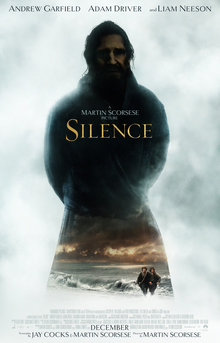
Last December, the movie Silence
opened to a conflicting maze of reviews. Some greatly praising the film and others exceedingly critical of the tale of the ‘apostate Jesuit priests’ of seventeenth century Japan. I watched it three days ago and am still pondering its meaning. The film is gripping and relentless. Both intensity and portent are conveyed instantly for viewers like me who never read Endo’s novel and ignorant of the history and political landscape in seventeenth century Japan. Silence: apostacy, Jesuit priests, 17th century Japan.
A brief background of Japanese history and politics is essential to understanding this film. Jesuit priest and missionary Frances Xavier brought Christianity to Japan in 1549. He wrote effusively about the Japanese people, calling them the ‘joy of his heart.’ For the next few decades, Japanese Christianity flourished and grew to over three-hundred Japanese Catholics. Frances Xavier’s dream of a Christian Japan seemed possible, even probable.
But by the 1620’s, the political situation changed suddenly and completely. A new leader, Iayesu, hostile to Christianity, emerged and with more choices for trading partners than merely Portugal, declared war on Christian Catholicism. Iayesu’s real target were the Jesuits who brought them a religion he believed poisonous for the Japanese people. Fr. Cristóvão Ferreira, the Portuguese provincial superior of the Jesuit mission, along with many others, refused to leave the country and went underground to support the vigorous Catholic community. But in 1633, Ferreira renounced his faith while suffering a uniquely barbarous torture known an the pit.
Andrew Garfield once again commands the screen
in a remarkable performance of Rodrigues, a fictional name for one of the two Jesuits who volunteered to find Ferreira and reveal the deceit behind the claim of the apostasy of his beloved mentor.
“Why am I being kept alive? Where is my martyrdom, my glorious martyrdom?” Rodrigues wonders. His Japanese captors have a keener understanding of Christianity than he realizes…Silence is the story of a man who learns-so painfully-that God’s love is more mysterious than he knows, that he leaves much more to the ways of men than we realize…and that He is always present, even in His Silence. For me, it is the story of a man who begins on the path of Christ and who ends replaying the role of Christianity’s greatest villian, Judas. He is almost literally following in his footsteps. In doing so, he comes to understand the role of Judas. This is one of the most painful dilemmas of Christianity. What was expected of Judas by Christ?…Endo looks at the problem of Judas more directly than any other artist I know…I picked up this novel twenty years ago. I’ve reread it countless times since and I am now preparing to adapt it as a film. It has given me a kind of sustenance I have found in only a very few works of art.
I leave you with Silence by the great Shusako Endo.
Martin Scorsese wrote the passage
above in a new preface to Silence, a novel of historical fiction by Shusako Endo, first published in 1966. A Japanese Roman Catholic, Endo has been called the ‘Graham Greene’ of Japan. After watching Scorsese’s film, which took him over thirty years to make, I understand the comparison. Both authors are Catholic and choose characters facing straightforward situations like adultery, faithlessness, betrayal and apostasy but in circumstances which are fraught with ambiguity.
I think it impossible to watch this movie without feeling powerful emotional reactions. Even for non-believers, the loathing for Christianity by the Japanese ‘Inquisitor’ dumbfounds. The medieval Japanese punishments for the crime of being Christian bring to mind our Christian brothers and sisters currently being slain in just these ways for their crimes of faith.
But the creative methods of torture devised by Iayesu for the last of the Jesuit priests stupefies, paralyzes and confounds. In his preface to the novel, Martin Scorsese writes about Rodrigues’s yearning for martyrdom, “but his Japanese captors have a keener understanding of Christianity than he realizes…”
Indeed.
Replete with contradictions and provocative questions, this film leaves a lingering sense of awe at the beauty and the horror of man; the most fitting reaction to it is, strangely, silence. And the profoundly unsettling conviction that had we been in the place of these men, had their zeal and courage, we would done the same as they.



